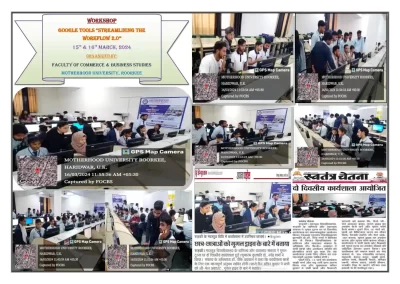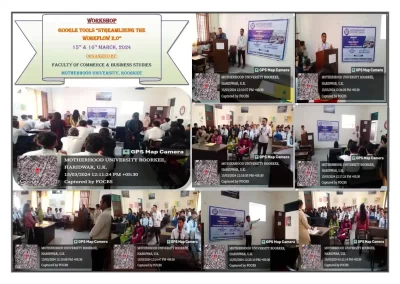Faculty of Commerce and Business Studies
Dean’s Message
WELCOME !
Education creates the culture for society. It is an insistent quest of knowledge, which helps an individual to grow and develop with the dynamic world. I excerpt the words of Dr. APJ Abdul Kalam in this context that ‘The purpose of education is to make good human beings with skill and expertise. Enlightened human beings can be created by teachers.”
In the contemporary economy, students must possess basic understanding, knowledge & skills of commerce & business concepts. There are certain issues which are of direct interest to the society like entrepreneurship, economy, management, taxation, import-export and the development of industries etc, which affect the society as a whole. Commerce and Management also looks at the various issues from social welfare’s perspective. In this context I would like to point that we at Faculty of Commerce & Business studies offer a curriculum to keep the zest high among the students. We promise our students to achieve excellence in higher education, by illuminating minds to become theoretically, resourcefully and socially competent.
I welcome you all to the Faculty of Commerce & Business studies, Motherhood University, Roorkee.
Best wishes for your future studies.
Prof. (Dr.) Pankaj Kumar Agarwal
DEAN
Faculty of Commerce and Business Studies
Faculty of Commerce & Business Studies
About
India is one of the fastest growing countries in the world and is poised to become the second largest economy in the world in the next two to three decades. This spectacular growth is being fuelled largely by their increasing domestic consumption and the entrepreneurial spirit of individuals. There is an ever increasing need for industry ready management professionals. Therefore there is a strong need for imparting business management education and training in the right way to make this dream a reality.
The Faculty of Commerce and Business Studies is committed towards developing business leaders of tomorrow by creating an environment of self-learning by encouraging students to stand on their feet, exchange ideas from faculty members and their colleagues, to experiment and learn by doing. We deliver benchmarked academic content from experienced faculty members and business leaders. The programs are designed to expose students to numerous subjects having applications in business, commerce and trade through outcome based teaching and learning process which accentuates on practical learning rather than only on theory. We believe in organizing seminars / webinars, guest lectures and workshops for the student’s holistic development.
Faculty of Commerce and Business Studies uses the pedagogy which keeps the pace with the evolving needs of the corporate world to make prospective managers foresee the volatile trends of business forces.
VISION
Faculty of Commerce & Business Studies aspires to be a vibrant and innovative centre for research and development in commerce and management. We would endeavour our best to equip students with knowledge and skills in their chosen stream, inculcate values, provide opportunities to realize their full potential and thereby contributing to the overall development of the society as a whole. FOCBS is committed to provide interdisciplinary education in a manner to exceed the expectations of all our stakeholders including the students, parents, industry, faculty members and employees and society at large by committing ourselves and our resources in effective & efficient manner.
MISSION
- To deliver a knowledge through teaching, research and extension; and to seek continuous improvement in the quality of education to remain globally competitive.
To impart curriculum that encourages students to be competent enough for best-fit job roles. - To provide faculty members with facilities to research, experiment and implement contemporary learning tools
- To nurture the future business leaders through imparting high quality value-based teaching, research and practical based training that meets industry expectations.
- To foster a passion for learning and creative thinking among the student and teaching community.
PLACEMENTS
Placement, undoubtedly is one of the most important priorities for the college. We thrive to achieve maximum placements for students through dedication, attitude and complete involvement. The entire spectrum of academic activities is oriented to provide the best possible placement to the students, enhancing their exposure to the outside world and to act as an interface between the college and the prospective employers of repute. A full fledged training and placement cell works tirelessly to fulfil this very objective.
Programs’ Details
FoCBS, Motherhood University
Bachelor of Commerce (Hons.)
B. Com. (Hons.)
Level: Degree
Program Duration: 3 Years ( 6 Semesters)
Eligibility: 10+2 OR equivalent in any discipline
Minimum Aggregate Score Requirement:
Gen/OBC-50 % | SC/ST- 45 %
Best in class infrastructure and facilities.

Bachelor of Commerce
B. Com.
Level: Degree
Program Duration: 3 Years (6 Semesters)
Eligibility: 10+2 OR equivalent in any discipline
Minimum Aggregate Score Requirement:
Gen/OBC-50 % | SC/ST- 45 %
Best in class infrastructure and facilities.

Master of Commerce
M.Com.
Level: PG Degree
Program Duration: 2 Years ( 4 Semesters)
Eligibility: B.Com. / B.Com. Hons. / B.B.A. / B.A. Hons. Economics
Minimum Aggregate Score Requirement:
Gen/OBC-50 % | SC/ST- 45 %
Best in class infrastructure and facilities.

Bachelor of Business Administration
B.B.A.
Level: Degree
Program Duration: 3 Years ( 6 Semesters)
Eligibility: 10+2 OR equivalent in any discipline
Minimum Aggregate Score Requirement:
Gen/OBC-50 % | SC/ST- 45 %
Best in class infrastructure and facilities.

Master of Business Administration
M.B.A.
Level: PG Degree
Program Duration: 2 Years ( 4 Semesters)
Eligibility: Any Graduation
Minimum Aggregate Score Requirement:
Gen/OBC-50 % OR equivalent CGPA/OGPA | SC/ST- 45 %
Best in class infrastructure and facilities.

MHU
M.B.A. Integrated
Level: Degree
Program Duration: 5 Years ( 10 Semesters)
Eligibility: 10+2 Or Equivalent
Minimum Aggregate Score Requirement:
Gen/OBC-50 % OR equivalent CGPA/OGPA | SC/ST- 45 %
Best in class infrastructure and facilities.

Master of Business Administration
M.B.A. (Part Time)
Level: PG Degree
Program Duration: 3 Years ( 6 Semesters)
Eligibility: Any Graduation
Minimum Aggregate Score Requirement:
Gen/OBC-50 % OR equivalent CGPA/OGPA | SC/ST- 45 %
Best in class infrastructure and facilities.

Doctor of Philosophy
Ph.D.
Doctor of Philosophy (Ph.D.) in Management
Doctor of Philosophy (Ph.D.) in Commerce
Eligibility: A candidate who has obtained a Master’s degree in the subject or related field with at least 55% marks in aggregate or a Grade Point Average (GPA) equivalent to 55% marks (5% relaxation for SC/ST and Physically handicapped candidates) in the subject concerned or has qualified the National Eligibility Test (NET) conducted by the University Grants Commission may apply for Admission for the Ph.D. degree at any time during the academic year for pursuing his/her research work under the guidance of a supervisor approved by the University. The candidates without NET/JRF/GATE/M. Phil will appear in the Research Entrance Test (RAT). Qualifying RAT is a mandatory requirement for such candidates.
Evaluation Scheme & Syllabus
Faculty of Commerce & Business Studies
B. Com.
B. Com. Hons.
M. Com.
B. B. A.
M.B.A.
M.B.A. Part Time
M.B.A. Executive
M.B.A. Integrated
Ph.D. Coursework
Dec. 2022 Onwards
Fee Structure
Faculty of Commerce & Business Studies
B.Com.
REGISTRATION FEE
PROGRAM FEE / YEAR
PROGRAM FEE / YEAR FOR UTTARAKHAND RESIDENTS
EXAM FEE / YEAR
B.Com. Hons.
REGISTRATION FEE
PROGRAM FEE / YEAR
PROGRAM FEE / YEAR FOR UTTARAKHAND RESIDENTS
EXAM FEE / YEAR
B.Com. Hons. With Research
REGISTRATION FEE
PROGRAM FEE / YEAR
PROGRAM FEE / YEAR FOR UTTARAKHAND RESIDENTS
EXAM FEE / YEAR
M.Com.
REGISTRATION FEE
PROGRAM FEE / YEAR
PROGRAM FEE / YEAR FOR UTTARAKHAND RESIDENTS
EXAM FEE / YEAR
B.B.A.
REGISTRATION FEE
PROGRAM FEE / YEAR
PROGRAM FEE / YEAR FOR UTTARAKHAND RESIDENTS
EXAM FEE / YEAR
B.B.A. Hons.
REGISTRATION FEE
PROGRAM FEE / YEAR
PROGRAM FEE / YEAR FOR UTTARAKHAND RESIDENTS
EXAM FEE / YEAR
B.B.A. Hons. With Research
REGISTRATION FEE
PROGRAM FEE / YEAR
PROGRAM FEE / YEAR FOR UTTARAKHAND RESIDENTS
EXAM FEE / YEAR
M.B.A.
REGISTRATION FEE
PROGRAM FEE / YEAR
PROGRAM FEE / YEAR FOR UTTARAKHAND RESIDENTS
EXAM FEE / YEAR
Events & Activities
e Content
Gallery













